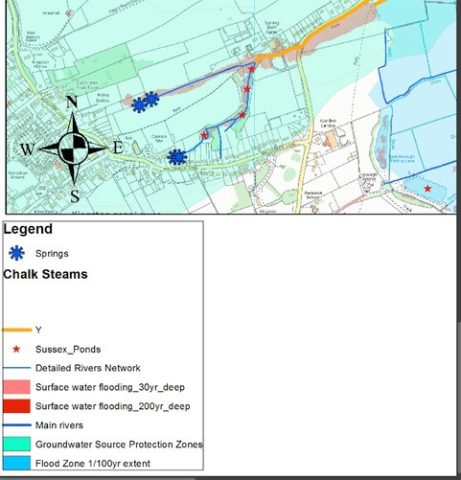The Cockshut chalk stream article
The Cockshut chalk stream in Kingston. October 2023
Chalk streams are a rare and unique habitat. Around 85% of the worlds 220 chalk streams are
found in England, many of these are in the Southeast, because of the chalk geology. The filtering
effect of chalk bedrock means the waters of chalk streams are alkaline and pure. Chalk streams
stable, mineral-rich waters, and relatively even temperature allow them to support an
exceptionally high number of species. These habitats are sometimes described as “England’s
Rainforests”.
In Kingston we are lucky to be the custodians of a rare chalk stream, the Cockshut. This 3km
stream connects the Downs and Kingston with the River Ouse. The downland all around the
village and parts of the village forms the catchment of the Cockshut. The Cockshut has its
springline and headwaters in Kingston where purified spring water collects in ponds around
Wellgreen Lane, including the fishing lakes of Spring Barn Farm. From the village it travels
alongside the field to Spring Barn Farm, alongside the cycle path into Lewes and then around the
back of Stanley Turner Rugby field.
It’s hard to imagine now that the Cockshut has a history as a working waterway and was used in
the past to deliver goods into Lewes at high tide. The Cockshut fed Lewes Priory’s meadows,
fishponds and mill. In the seventeenth century, water from the stream fed into Lewes’ first
pumped water supply. Over time, the Cockshut was straightened, deepened, widened, and
disconnected from the surrounding landscape. Like most chalk streams the Cockshut has been
adversely impacted by human activities. Radical action is needed to better protect our chalk
streams.
Happily, the Cockshut Stream Restoration Project (www.cockshutstream.org) is a wonderful
example of nature recovery. The project has recently re-aligned the stream into a new channel
which now flows through a newly created 6.8 hectare wetland habitat to the east of the Stanley
Turner Ground. Already we can see geese and waders enjoying the new wetland.
As custodians of the source of the Cockshut there are several things we can do in Kingston to
protect this precious chalk stream.
• Keep the springs and ponds safe from harm
• Identify how the Cockshut is managed in Kingston (for example, directed underground in
pipes, resurfacing in the field). Is there any abstraction – borehole?
• Water filters into the Cockshut from our gardens so keeping our gardens chemical free.
• Raise awareness within the village that we have an internationally, special natural feature
in our midst.
• Contact The Cockshut Stream Restoration Project (www.cockshutstream.org) to see if we
can contribute through our actions in the parish.
• Volunteer with the Lewes Railway Land Wildlife Trust who are coordinating volunteer
sessions from October 2023 on the first Saturday and second Friday of the month. Contact
Beverley at beverley@railwaylandproject.org
Further Information:
Chalk streams
Government chalk stream strategy
SDNPA case study Cockshut Stream Restoration
friends-of-lewes winterbourne-and-cockshut-the-streams-of-western-lewes


